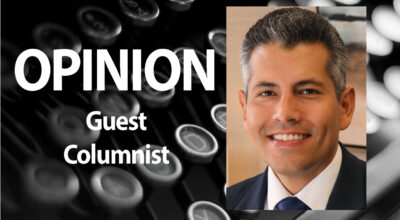THE IDLE AMERICAN: A Ford in His Past
Published 9:45 am Wednesday, March 14, 2018
Commentary by Dr. Don Newbury
“One thing for sure,” a reader mentioned the other day, “most of your columns are centered on your own ‘back when’ memories.” An easy counter is that just as many pieces are written about their “back when” recollections.
Some of the most poignant accounts are from folks 90 or more years of age. Engage them in conversation, however brief, and they’re apt to flip back memory calendars to the 1930s, when the Great Depression gripped our land.
They commonly draw on true experiences, often coaxing smiles from faces too often sullen in the hurried living of these days. An expression commonly heard is, “We were all poor, but we didn’t know it.”
One such old-timer is Fort Worth’s Dale Scarth, whose professional career with electric power companies spanned more than 40 years. It began with jobs he says were a few ladder rungs below entry level, but he progressed steadily upward. His final years he spent as president of what was then called Texas Electric Service Company.
Keen of mind, he remembers childhood years in Booker–a small community in the corner of the Texas Panhandle. There, folks can ‘pert near see two sides of Oklahoma from their front porches.
Dale’s dad, the late Willard Riley Scarth, was co-owner of the Mitchell-Scarth Ford dealership in Booker. This was back when many weddings were held in the morning or early afternoon so newlyweds could save daylight for flat-changing en route to honeymoon destinations. They say many such trips were mounted with multiple “aired-up spare tires,” and tube repair patch kits were in every glove box.
In 1937, Ford came out with a smaller 60HP, V-8 engine. There was much ballyhoo about its quiet ride and claim of covering 30 miles on a gallon of gas.
Gas was plenty cheap, but the claim, Dale says, helped get peoples’ minds off of changing flat tires.
Kenneth Trosper was a fun-loving jokester in Booker, and he challenged the Ford claim by offering Scarth a $10 wager that the car wouldn’t make it 30 miles on a gallon of gas.
The dealer accepted the wager, and offered to “make things more interesting.”
They poured exactly one gallon of fuel into the new vehicle, then drove to the 15-mile marker from town. On the way back, if the car stopped short of the city limits, Scarth would pay Trosper the ten bucks, then walk into town for more gas. If it covered more than 30 miles, however, Trosper would pay, and he would likewise “foot it” back to town for more fuel. Sure enough, it ran for 34 miles.
In a parade the next day, the ’37 Ford was featured. Scarth placed a big banner on each side, reading: “This car will get 34 miles per gallon. If you don’t believe it, ask Kenneth Trosper.
Dale says he and his siblings feared that their dad would lose the wager; a $10 loss in those days could inflict serious injury to a small business.
The children learned the value of money early on, particularly on the farm, where there were more chores than hands to do them.
“An unexpected nickel earned in those days” was a quick attitude-changer,” he says.
David Scarth, Dale’s son who lives in Mason, remembers “nickel stories” that accompanied cow-milking chores shared by his dad and Uncle Bob, a resident of Amarillo.
They took turns milking the cow. The “milker” was paid a nickel. He had to fork it over to his brother, however, if the latter could squeeze a full six ounces of milk into a Coke bottle after the “milker” claimed to be finished.
One thing for sure–cows were almost always milked dry, and Coke bottles usually remained dry, even after “big squeezes” by the other brother who really wanted that nickel.
Dr. Newbury is a former educator who speaks throughout Texas and the Southwest. Comments/inquiries to: newbury@speakerdoc.com. Phone: 817-447-3872. Web site: www.speakerdoc.com. Twitter: @donnewbury; Facebook, don newbury.





